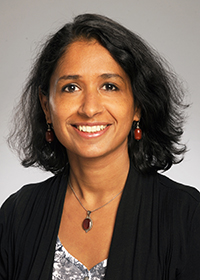Jyothi Rengarajan, PhD

Contact Information
Additional Websites
Professor, Emory Vaccine Center
Professor, Department of Medicine, Division of Infectious Diseases, Emory University School of Medicine
Researcher, Emory National Primate Research Center
Investigator, Emory Center for AIDS Research
Dr. Jyothi Rengaragan joined the Emory Vaccine Center in the fall of 2007 as an Assistant Professor in the Division of Infectious Diseases, Department of Medicine at Emory University and is an Emory Global Health Institute Distinguished Faculty awardee. Her research program centers on understanding the mechanisms of Mycobacterium tuberculosis pathogenesis and host immunity to infection. Dr. Rengarajan received her Ph.D. from Harvard University in 2001 where she studied transcriptional regulation of T helper cell differentiation. During her post-doctoral training and then as a Research Associate at the Harvard School of Public Health, she used functional genomics as well as microbiological and immunological approaches to understand macrophage-pathogen interactions in tuberculosis. At Emory, Dr. Rengarajan’s research projects encompass both basic and translational approaches to understanding tuberculosis in mouse models and humans.
Research Interests:
We are interested in understanding how the bacterial pathogen Mycobacterium tuberculosis evades host immunity. Worldwide, approximately 9 million cases of tuberculosis (TB) are reported each year, causing upto 1.5 million deaths. While 10% of healthy individuals are estimated to progress to active TB disease after exposure to M. tuberculosis, the majority bacteria within lung granuloma lesions in a latent state. However, because the immune response fails to eradicate M. tuberculosis, individuals with latent TB infection (LTBI) are at increased risk for reactivation to active TB disease when immune-compromised. Indeed, the HIV/AIDS pandemic is fueling TB rates and currently, one in four of the deaths in people with HIV worldwide are due to TB. Developing an effective vaccine that prevents TB is therefore critical for controlling TB globally. Moreover, the emergence of multi- and extensively drug resistant (MDR and XDR) strains of M. tuberculosis points to the urgent need for new drugs and immune-therapeutics to better treat disease. The ongoing projects in the laboratory include the following research areas.
1. M. tuberculosis manipulation of host immune responses. Using a combination of functional genomics, proteomics, microbiologic and immunologic approaches in mouse models and human cells, we have identified cell-wall associated and secreted M. tuberculosis proteins that modulate macrophage and dendritic cell function to subvert host immunity. We are actively engaged in delineating the molecular and biochemical basis for their functions. We expect that detailed understanding of how M. tuberculosis modulation of TLR and other innate immune pathways affects M. tuberculosis -specific T cell responses, will facilitate development of immune-therapeutics that can modulate the balance between beneficial and detrimental inflammatory responses as well as synergize with existing anti-TB drugs.
2. Human immunity to latent and active TB andi dentification of diagnostic biomarkers. We have established a patient-based research program in metro Atlanta in collaboration with Emory infectious disease physician Dr. Susan Ray, to study human immunity to latent and active TB in individuals recruited from Grady Memorial Hospital and the Fulton and Dekalb County Health Departments. We have characterized the immune phenotype and function of M. tuberculosis-specific memory CD4 T cells in HIV-negative individuals with LTBI and identified potential immune markers of M. tuberculosis persistence. We are extending these studies to HIV-infected individuals with LTBI to understand how HIV co-infection perturbs latency. We also aim to identify human surrogate biomarkers of latent, active and clinically resolved TB that could improve TB diagnostics and improve monitoring of anti-TB treatment.